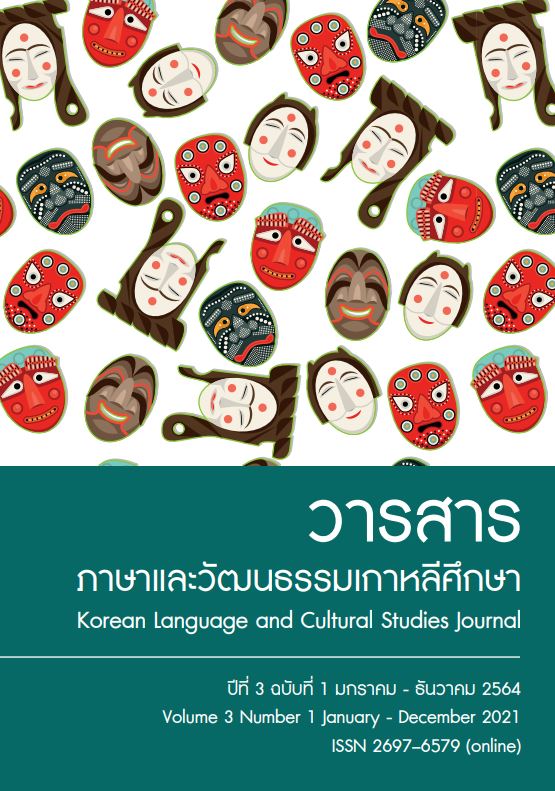A Past has never changed but memory has never let it go: An Exploratory theme and stylistic of memory and trauma narration in K-Series “Hotel Del Luna"
Main Article Content
Abstract
This article aims to study memory and trauma and processes of traumatic narrative in the K-series “Hotel Del Luna”. This series presents the story of a spirit in its afterlife. It uses fantasy narratives to present critical themes in the story: abandonment, healing of the wounds of pain. and transcending the past to realize the value of life. The series also presents interesting symbols and beliefs, such as the bridge, Moon tree, the story of myths, deities, beliefs, afterlife, the belief in ghost marriage for criticizing the contradictions between modern and traditional beliefs related to Confucian ideals. The highlight of this series was to reveal the significant finding that the past was not the present that separated timeline clearly; division of life and death; and the use of a tragic ending scene which gives the audience an idea of life in today's society.
Article Details
References
ต้องรัก จิตรบรรเทา. (2560). บุคลิกภาพตามทฤษฎีจิตวิเคราะห์. วารสารสังคมศาสตร์วิชาการ, 10(2), 275-285.
ธีระพงษ์ มีไธสง. (2560). ผีกับพุทธการผสมผสานทางความเชื่อ. กรุงเทพฯ: อินทนิล.
พิชาภพ พันธุ์แพ. (2559). การจัดการแบบเกาหลีใต้: น่าศึกษาและจับตามอง. วารสารเศรษฐศาสตร์และการบริหารธุรกิจ มหาวิทยาลัยทักษิณ, 9(1), 1-14.
พีรพล ภัทรนุธาพร. (2561). โลกหมุนรอบกลัว. กรุงเทพฯ: Geek book.
รัญวรัชญ์ พูลศรี และคณะ. (2563). ขงจื๊อนิยมและอิทธิพลต่อสตรีในเกาหลีและเวียดนาม. วารสารจีนศึกษา มหาวิทยาลัยเกษตรศาสาตร์, 13(1), 397-420.
วีรญา กังวานเจิดสุข. (2562, 30 ตุลาคม). ผีสาวโสด ชอ-นยอควีชิน ผีที่หลอกหลอนให้ผู้หญิงเกาหลีวิ่งเข้าหาความรัก. สืบค้นเมื่อ 17 กันยายน 2564 จาก https://themomentum.co/sho-nyok-kwi-shin-korean-ghost/
อาจวรงค์ จันทมาศ. (2561). ความทรงจำคืออะไร ไขความลับการทำงานของสมองถอดรหัสความทรง จำของมนุษย์. สืบค้นเมื่อ 17 กันยายน 2564 จาก https://thestandard.co/ science-find-remembrance/
Avia. (2017). Symbolic moon facts. Retrieved June 25, 2021, from https://www.whats-your-sign.com/symbolic-moon-facts.html
Aviv, R. (2021). Past Imperfect. Retrieved June 25, 2021, from https://www.newyorker.com/magazine/2021/04/05/how-elizabeth-loftus-changed-the-meaning-of-memory
Beng, C. H., & Iwabuchi, K. (2008). East Asian Pop Culture: Analysis the Korean Wave (TransAsia: Screen Cultures). Hong Kong: Hong Kong University Press.
Caryl-S. (2012). Dia de los Muertos. Retrieved June 29, 2021, from https://www.nationalgeographic.org/media/dia-de-los-muertos/
Fercility Jiang. (2021). Hungry ghost festival. Retrieved June 28, 2021, from https://www.chinahighlights.com/festivals/hungry-ghost-festival.htm
Garland C. (1998). Understanding trauma: A psychoanalytical approach. Great Britain: the MPG Rooks Group, Bodmin and King's Lynn.
Laure. (2020). Hotel Del Luna (2019 Drama): Cast & summary. Retrieved May 12, 2021, from https://www.kpopmap.com/hotel-del-luna-2019-drama-cast-summary/
Maurice Halbwachs. (1950). La mémoire collective. Paris: Albin Michel.
Mitu, B. (2015). Confucianism and the contemporary Korean society. Rom. Jour. of Sociological Studies, 1, 31-38.
Sleziak, T. (2014). The Influence of confucian values on modern hierarchies and social communication in China and Korea: A comparative outline. KRITIKE, 8(2), 207-232.
Sparks, N. (n.d.). Quotes of famous people. Retrieved May 12, 2021, from https://quotepark.com/quotes/959784-nicholas-sparks-the-reason-it-hurts-so-much-to-separate-is-because/
Tong, A. L. (2008). Re-Imaging a cosmopolitan 'Asian Us': Korean Media Flows and Imaginaries of Asian Modern Feminities. In C. B. Iwabuchi, & C. B. Iwabuchi (Ed.), East Asian pop culture: Analysis the Korean wave. (pp. 127-130). Hong Kong: Hong Kong University Press.
Whitehead, A. (2004). Trauma fiction. Edinburgh: Edinburgh University Press.


